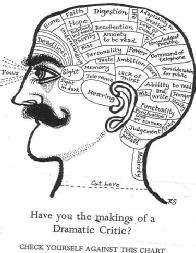Shakespeare from Page to Stage to Page
EN337: Shakespeare from Page to Stage to Page, 2008-09
Dr Paul Prescott
pushkinp@yahoo.co.uk or p.prescott@warwick.ac.uk
H514
OFFICE HOURS (AUTUMN): Tuesday 3-4pm; Wednesday 12-1pm
AIMS
This module provides final-year Theatre Studies and English students with an opportunity to explore, in depth, the translation of Shakespeare’s texts into performance. It combines theatre history and textual analysis with a strong emphasis on practical, creative and collaborative work. We will explore how actors, directors and adaptors make live theatre from the raw material of Shakespeare’s texts, and how we, as critics, make sense of and write about those performances. We will see, read and discuss a wide range of performances and texts. Most challengingly, we will take a Shakespeare text and re-wright/adapt it for an imagined or actual performance. The process of this adaptation and a critique of the end product will be recorded in individual logbooks.
ASSESSMENT
Review Essay (20%)
- Deadline: 19 January 2009 (Week 3)
-
1,500 words
Titles
1) Write an analysis of one or two adaptations of a Shakespeare play. You should consider some of the following factors: its relationship to the original; the social and theatrical context of the adaptation; its tone, language, structure and dramatic effect; the reception and performance history of the adaptation.2) Write an analysis of one or two live performances of a Shakespeare play seen during the course of the module so far (i.e. one or two from Love’s Labour’s Lost or Romeo and Juliet).
Group Project (40%)
Portfolio / Logbook (40%)
Deadline for 1st Draft of Performance Text: 26 January (Week 4)
Deadline for complete Portfolio: 4 May 2009
Contents:
- Group Performance Text (40% of overall mark)
- Individual Contribution to Performance (15%)
- Three Performance Reviews (15%)
- Personal Reflection (10%)
Group Performance Text:
An adaptation of a Shakespearean original designed for performance. Both the source play and the nature of the adaptation will emerge from a series of Group Meetings and workshops.
The final product will show consideration of a number of key issues in Shakespearean adaptation and performance, including: casting and doubling; cutting and adaptation; set design and costume; rehearsal techniques; theatre space; potential audiences; ‘paratexts’ (programmes, pre-publicity); authenticity and infidelity; archaisms; punctuation; politics.
Agreed Minutes from all Group Meetings detailing interpretive and creative discussions and decisions will form an Appendix to the text.
Individual Contribution to Performance:
This will be your own specialist contribution to the proposed theatrical event. This contribution might involve: costume sketches/research; programme writing and compilation; scene or passage work-shopping (as actor, director or dramaturge); stage history background of the adapted text; set design sketches/research; and so on. Equally, you might write a piece analysing, justifying and/or critiquing your adaptation.
Three Performance Reviews (3 x 750 words):
These should be written as if for publication in a national newspaper.
Personal Reflection (1-2,000 words):
How have this module and the process of adapting the play changed your attitude to: Shakespeare; adaptation; reviewing; collaboration; theatre; studying and learning?
THEATRE TRIPS AND KEY DATES
Autumn Term Key Dates
Week 3, 7.15pm, Wednesday 15th October: LOVE’S LABOUR’S LOST (dir. Gregory Doran, starring Dr Who) at Courtyard Theatre, Stratford.
TRIP:
Week 10, 7.15pm, Monday 1st December: ROMEO AND JULIET (dir. Neil Bartlett) at Courtyard Theatre, Stratford.
Spring Term Key Dates
TRIP:
Week 3, 3pm Sunday 25th January: TWELFTH NIGHT (dir. Michael Grandage, starring Derek Jacobi) at Wyndhams Theatre, London
Week 5, 7.30pm Monday 2nd or Tuesday 3rd February: OTHELLO at Warwick Arts Centre.
TRIP:
Week 7, 7.15pm Thursday 19th February: THE TEMPEST at The Courtyard Theatre, Stratford-upon-Avon.
PRESENTATION OF WORK IN PROGRESS: Week 9, Wednesday 4th March, 7 – 9.30pm, Studio, CAPITAL.
Summer Term Key Dates
PRESENTATION OF WORK IN PROGRESS: Week 2, Friday 1st May. CAPITAL Centre (as part of CAPITAL Festival).DEADLINE FOR SUBMISSION: Week 3, Monday 4th May.
A note on finances: the intention is to keep the cost of our theatre trips as low as possible, probably £5 per trip (ticket and transport; more for the trip to London in January). To help keep costs down, it may be helpful if anyone with a car would be willing to drive to Stratford and back. Or, if you’re over 21 and prepared to drive a minibus, we could travel en masse. I have made a point of not requiring you to buy any texts that you would not otherwise need for other modules. (Most of the required primary reading for this module is scanned online.) Please think of the £40 or so you’ll spend on theatre over the year as an equivalent outlay.
SYLLABUS AND ASSIGNMENTS – Autumn Term 2008
|
Week |
Main theme / texts
|
Reading
|
Tasks
|
Trips
|
| 1
|
Intro to module.
|
Hartley and Marowitz
|
Read: Hamlet, Dr Faustus, Romeo and Juliet Adaptation analysis
|
|
| 2
|
What is a Review?
|
|
Reviewer Analysis
|
|
| 3
|
Reviewing Shakespeare; preparing to watch LLL
|
Love’s Labour’s Lost; Stage history of LLL, Arden edition
|
Post review of LLL to group by Saturday
|
Love’s Labour’s Lost, Wed 15th October, 7.30pm STRATFORD
|
| 4
|
Workshop Reviews of Love’s Labour’s
|
Group Reviews; Newspaper reviews of LLL (after writing own)
|
Post review of LLL on ISE
|
|
| 5
|
Meaning by Shakespeare: Interpretation as Appropriation
|
Fischlin; Hutcheon; Sanders
|
Defining appropriation and adaptation / PP shares work from EN337 class of 2007
|
|
| 6
|
READING WEEK
|
Read Hamlet Collage and Hamlet Machine; Hamburger
|
|
|
| 7
|
Adaptation1
|
Hamlet Collage / Hamlet Machine
|
Presentations: Marowitz, Muller
|
|
| 8
|
Adaptation 2
|
Dr Faustus
|
Groups: Produce outline, sample and pitch for Faust Collage and Faust Machine
|
|
| 9
|
Adaptation 3
|
Romeo and Juliet adaptations;
|
Presentations: Romeo and Juliet in performance
|
|
| 10
|
Preparing to watch Romeo
|
Levenson stage history
|
|
Romeo and Juliet,
|
Four Thoughts on Reviewing:
The critic as aesthetic arbiter has, I think, no proper social function, no defensible criteria upon which to base his subjective judgments, and, historical precedent notwithstanding, no strong case at law with which to defend them […] the critic could be retrained as a data collector, confined to the production of objective statements, and encouraged to redeem himself in a society for which […] he has served as a morally disruptive, and aesthetically destructive, influence.
Glenn Gould,
The Glenn Gould Reader
There seem to be strange ideas about what constitutes a critic, particularly a dramatic critic. Given a sense of humour and a nimble pen and not much else is thought to matter. Never mind if the writer is entirely unversed in a highly technical craft, never mind if by temperament he is wholly unfitted for any such vocation, provided he is facile and amusing from the point of view of the newspaper reader.
Bernard Weller, ‘Probation for Critics’. The Critics’ Circular 1:1 (Nov. 1923), 5.
The first thing any critic ought to make clear is his capacity for boredom. The man who never yawns in the theatre is a menace to it, as callow and gullible as he is insensitive. Only maniacs are never bored. The extreme, total pleasure a critic gets out of a work of art is so elating that, in its absence, he resembles nothing so much as an addict who has lost his hypodermic.
Kenneth Tynan, first review in The Daily Sketch, 1951
Every piece of criticism I ever wrote grew out of […] a desperate tussle to follow the vagaries of my own style in order to understand fully the intricacies of my own reaction. One should also mention that never-ending struggle being waged between biases, prejudices, and an attempt to be fair – not in any flaccid, objective sense, but to the whirl of one’s own feelings. That kind of fairness, the need to seize the truth of one’s own response out of the fire of contradictory emotions, is perhaps the most agonizing part of criticism.
Charles Marowitz, Confessions of a Counterfeit Critic, 35
Bibliography – Scanned Articles online
http://www.warwick.ac.uk/go/lib-course-extractsClick on ‘English’, then on ‘EN327’ (even though we are EN337).
This is where most of the set readings can be found. If you have any trouble accessing these, I can also send them via email in PDF format.
Bibliography - Library
SHAKESPEARE: Stephen Greenblatt et al, eds. The Norton Shakespeare or Bate/Rasmussen eds. Palgrave Complete Works. See Arden, Oxford, Cambridge series for individual editions of key plays.
Edward Braun. The Director and the Stage. London, 1982.
Declan Donnellan. The Actor and the Target. London, 2002.
Aristotle (tr. Kenneth Mcleash), Poetics. London, 1999.
Maria Delgado and Paul Heritage, eds., In Contact with Gods? - Directors Talk Theatre. Manchester, 1996.
David Bradby and David Williams. Directors’ Theatre. Basingstoke, 1988.
Colin Counsell. Signs of Performance: An Introduction to Twentieth Century Theatre. London, 1996.
Alison Hodge. Twentieth-Century Actor Training. London, 2000.
David Wiles. A Short History of Western Performance Space. Cambridge, 2003.
Susan Bennett. Theatre Audiences. London, 1997.
Stanley Wells, ed. Shakespeare in the Theatre. Oxford, 1997.
Rebecca Schneider and Gabrielle Cody, eds. Re:Direction, A theoretical and practical guide. London, 2002.
Ric Knowles, Reading the Materialist Theatre. Cambridge, 2004.
Dennis Kennedy, Looking at Shakespeare. Cambridge, 2003.
Stanley Wells and Sarah Stanton (eds), The Cambridge Companion to Shakespeare on Stage. Cambridge, 2002.
Jonathan Bate and Russell Jackson (eds), The Oxford Illustrated History of Shakespeare on Stage. Oxford, 1996.
Gary Taylor, Moment by Moment by Shakespeare. London, 1985.
Gary Taylor, Reinventing Shakespeare: a cultural history from the Restoration to the present. London, 1990.
Martin Buzzacott, The Death of the Actor: Shakespeare on Page and Stage. London, 1991.
Harry Berger Jr, Imaginary Audition: Shakespeare on Stage and Page. London, 1989.
Richard Drain, Twentieth-Century Theatre: A Sourcebook. London, 1995.
Daniel Fischlin and Mark Fortier, eds., Introduction to Hamletmachine, p.208-10
Michael Bogdanov, Shakespeare: The Director’s Cut for chapters on Hamlet, Romeo and Juliet, pp.9-49 (photocopy?)
Web Resource: http://www.routledge.com/shakespeare/adaptations.html


